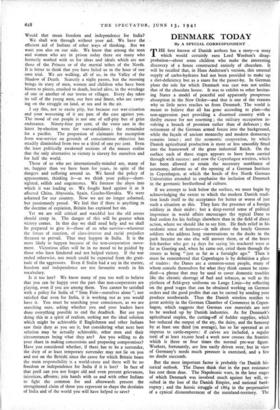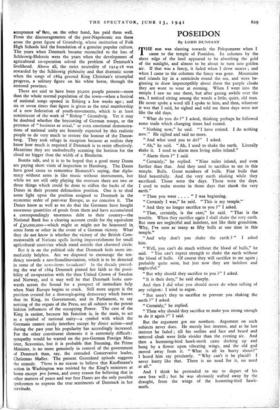DENMARK TODAY
By A SPECIAL CORRESPONDENT
THE best known of Danish authors has a story—a story which would certainly earn Lord Woolton's disap- probation—about some children who make the interesting discovery of a house constructed entirely of chocolate. It will be recalled that, in Hans Andersen's version, this unusual supply of carbo-hydrates had not been provided to make up a diet-deficiency but as a snare for the passer-by. In German plans the role for which Denmark was cast was not unlike that of the chocolate house. It was to exhibit to other hesitat- ing States a model of peaceful and apparently prosperous absorption in the New Order—and that is one of the reasons why so little news reaches us from Denmark. The world is meant to believe that all has gone according to plan—the non-aggression pact providing a disarmed country with a thrifty excuse for not rearming ; the military occupation in- volving a breach of promises rather than of defences ; the retirement of the German armed forces into the background, while the façade of ancient monarchy and modern democracy remains intact ; and the economic cooperation, by which Danish agricultural production is more or less smoothly fitted into the framework of the great industrial Reich. On the surface each of these stages appears to have been carried through with success : and now the Copenhagen wireless, which has been allowed to retain the necessary semblance of autonomy, informs us of the opening of a German Institute in Copenhagen, at which the heads of five North German Universities attended to emphasise the inclusion of Denmark in the germanic brotherhood of culture.
If we attempt to look below the surface, we must begin by acknowledging the extent to which the modern Danish tradi- tion lends itself to the acceptance for better or worse of just such a situation as this. They hate the presence of a foreign soldiery in their midst : but a deep-rooted sense of political impotence in world affairs encourages the typical Dane to find outlets for his feelings elsewhere than in the field of direct action, where we should like to see him. He finds relief in his sardonic sense of humour—in talk about the lonely German soldiers who address long conversations to the ducks in the park because no one else will answer them, or of the brave fish-hawker who got 14 days for saying his mackerel were as fat as Goering and, when he came out, cried them through the streets as being " just as fat as a fortnight ago." Then it must be remembered that Copenhagen is by definition a place of traders: the Danes are a common-sense people, many of whom console themselves for what they think cannot be reme- died—a phrase that may be used to cover domestic troubles like the chronic shortage of fuel and tobacco, as well as the plethora of field-grey uniforms on Lange Linje—by reflecting on the good wages that can be obtained working on German orders and the good profits that can be earned by sending your produce southwards. Thus the Danish wireless testifies to great activity in the German Chamber of Commerce in Copen- hagen, which suggests that German raw materials are sent to be worked up by Danish industries. As for Denmark's agricultural staples, the cutting-off of fodder supplies, which has reduced the output of the sty, the dairy, and the hencoop by at least one third (on average), has so far operated as an impetus to cattle-exports: if calves are included, a regular total of at least io,000 head a week now crosses the frontier, which is three or four times the normal pre-war figure. Workers, fortunately, are less easily driven over, but in view of Germany's needs much pressure is exercised, and a few no doubt succumb.
But the most important factor is probably the Danish his- torical outlook. The Danes think that in the past resistance has cost them dear. The Napoleonic wars, in the later stages of which Denmark was involved much against her will, re- sulted in the loss of the Danish Empire, and national bank- ruptcy ; and the heroic struggle of 1864 in the perpetuation of a cynical dismemberment of the mainland-territory. The acceptance of fate, on the other hand, has paid them well. From the discouragements of the post-Napoleonic era there arose the great figure of Grundtvig, whose institution of Folk High Schools laid the foundation of a genuine popular culture. The years when Denmark became reconciled to the loss of Schleswig-Holstein were the years when the development of agricultural co-operation solved the problem of Denmark's livelihood. Above all, the strict neutrality of 1914-18 was rewarded by the Schleswig plebiscite and that dramatic scene when the songs of 1864 greeted King Christian's triumphal progress, a solitary figure on his white horse, through the restored province.
There are said to have been so,000 people present—more than the whole normal population of the town—when a festival of national songs opened in Esbjerg a few weeks ago ; and six or seven times that figure is given as the total membership of a new federation of youth-movements, which is at least reminiscent of the work of " Bishop " Grundtvig. Yet it may be doubted whether the boycotting of German troops, or the pretence of " business as usual," or even emotional demonstra- tions of national unity are honestly expected by this realistic people to do very much to restore the honour of the Danne- brog. They seek refuge in escapism because as realists they know how much is required if Denmark is to resist effectively. Meantime they are undoubtedly scanning the horizon for the cloud no bigger than the width of a Blenheim.
Bombs talk, and it is to be hoped that a good many Danes are paying short visits of inspection to Hamburg. The Danes have good cause to remember Bismarck's saying, that diplo- macy without arms is like music without instruments, but while we are still only playing the overture there are two or three things which could be done to stiffen the backs of the Danes in their present defenceless position. One is to shed some light upon the position assigned to Denmark in the economic order of post-war Europe, as we conceive it. The Danes know as well as we do that the Germans have bought enormous quantities of goods from them and have accumulated a correspondingly enormous debt to their country—the National Bank has a clearing account credit for the equivalent of JJ3o,000,000—which might or might not be honoured in, some form or other in the event of a German victory. What they do not know is whether the victory of the British Com- monwealth of Nations spells lasting impoverishment for small agricultural• countries which stand outside that charmed circle.
But it is on the political side that Denmark feels more im- mediately helpless. Are we disposed to encourage the ten- dency towards a neo-Scandinavianism, which is to be detected in some of the news-items broadcast? In the decade preced- ing the war of 1864 Denmark pinned her faith to the possi- bility of co-operation with the then United Crown of Sweden and Norway, and it may well be that Denmark looks east- wards across the Sound for a prospect of immediate help when Nazi Europe begins to crack. Still more urgent is the problem created for a thorough-going democracy which knows that its King, its Government, and its Parliament, to say nothing of the organs of the Press, are all subject to the potent hidden influences of the occupying Power. The case of the King is easiest, because his function is, in the main, to act as a symbol of national unity—a symbol with which the Germans cannot easily interfere except by direct action—and during the past year his popularity has accordingly increased. For the other constituent elements it is extremely difficult: sympathy would be wasted on the pro-German Foreign Min- ister, Scavenius, but it is probable that Stauning, the Prime Minister, is no more genuinely in control of the government of Denmark than, say, the extruded Conservative leader, Christmas Mgller. The present Greenland episode suggests the remedy. There is no reason to believe that Kauffmann's action in Washington was resisted by the King's ministers at home except pro forma, and every reason for believing that in other matters of peace and war free Danes are the only possible spokesmen to express the true sentiments of Denmark in her servitude.



























 Previous page
Previous page